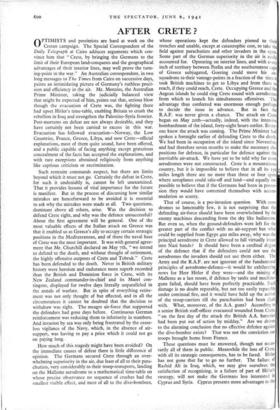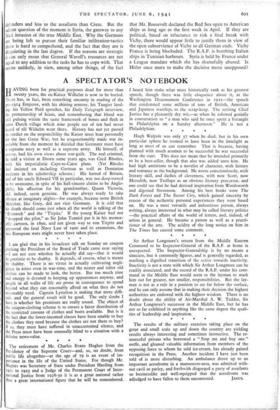AFTER CRETE ?
OPTIMISTS and pessimists are hard at work on the Cretan campaign. The Special Correspondent of the Daily Telegraph at Cairo adduces arguments which con- vince him that " Crete, by bringing the Germans to the limit of their European land-conquests and the geographical advantages of their interior lines, may well prove the turn- ing-point in the war." An Australian correspondent, in two long messages to The Times from Cairo on successive days, paints an intimidating picture of Germany's ruthless preci- sion and efficiency in the air. Mr. Menzies, the Australian Prime Minister, taking the judicially balanced view that might be expected of him, points out that, serious blow though the evacuation of Crete was, the fighting there had upset Hitler's time-table, enabling Britain to crush the rebellion in Iraq and strengthen the Palestine-Syria frontier. Post-mortems on defeat are not always desirable, and they have certainly not been carried to excess in this war. Evacuation has followed evacuation—Norway, the Low Countries, France, Greece, Libya, and now Crete—official explanations, most of them quite sound, have been offered, and a public capable of facing anything except gratuitous concealment of the facts has accepted the explanations, and with rare exceptions abstained religiously from anything like captious criticism or recrimination.
Such restraint commands respect, but there are limits beyond which it must not go. Certainly the defeat in Crete, for such it undeniably is, cannot be left unexamined. That it provides lessons of vital importance for the future is manifest. But in the process of discussing how similar mistakes are henceforward to be avoided it is essential to ask why the mistakes were made at all. Two questions, dominant above all others, arise. Was the decision to defend Crete right, and why was the defence unsuccessful? About the first agreement will be general. One of the most valuable effects of the Italian attack on Greece was that it enabled us as Greece's ally to occupy certain strategic positions in the Mediterranean, and of these the naval base of Crete was the most important. It was with general agree- ment that Mr. Churchill declared on May 7th, " we intend to defend to the death, and without thought of retirement, the highly offensive outposts of Crete and Tobruk." Crete has been defended to the death. Never in British military history were heroism and endurance more superb recorded than the British and Dominion force in Crete, with its New Zealand commander-in-chief and its Maori con- tingent, displayed for twelve days literally unparalleled in the annals of warfare. But in spite of everything retire- ment was not only thought of but effected, and in all the circumstances it cannot be doubted that the decision to withdraw was right. The meagre air-force that supported the defenders had gone days before. Continuous German reinforcement was reducing them to inferiority in numbers. And invasion by sea was only being frustrated by the cease- less vigilance of the Navy, which, in the absence of air- support, was having to pay a price which it could not go on paying long.
How much of this tragedy might have been avoided? On the immediate causes of defeat there is little difference of opinion. The Germans secured Crete through an over- whelming superiority in the air, due least of all to their para- chutists, very considerably to their troop-transports, landing on the Malleme aerodrome to a mathematical time-table on whose precise observance no sequence of crashes had the smallest visible effect, and most of all to the dive-bombers, whose operations kept the defenders pinned to their trenches and unable, except at catastrophic cost, to take the field against parachutists and other invaders in the open. Some part of the German superiority in the air is easil accounted for. Operating on interior lines, and with eve inch of territory between Berlin and the southernmost ca of Greece subjugated, Goering could move his air squadrons to their vantage-points in a fraction of the time took British machines to get to Libya and from there to reach, if they could reach, Crete. Occupying Greece and th Aegean islands he could ring Crete round with aerodromes from which to launch his simultaneous offensives. The advantage thus conferred was enormous enough perhaps to decide the issue in advance. But in fact the R.A.F. was never given a chance. The attack on Crete began on May 2oth—actually, indeed, with the intensive bombardment of the.island, forty-eight hours earlier. Every- one knew the attack was coming. The Prime Minister had spoken a fortnight earlier of defending Crete to the death We had been in occupation of the island since November and had therefore seven months to make the necessary dis- positions for defence, in particular for defence against the inevitable air-attack. We have yet to be told why far more aerodromes were not constructed. Crete is a mountainous country, but it is impossible to believe that in all its 1 co miles length there are no more than three or four spots where aeroplanes could take-off and land—and equally im- possible to believe that if the Germans had been in posses- sion they would have contented themselves with accom- modation so scanty.
That of course, is a pre-invasion question. With aero- dromes so lamentably few, it is not surprising that the defending air-force should have been overwhelmed by the enemy machines descending from the sky like hailstorms. But even so, when the ground-defenders were left for the greater part of the conflict with no air-support but what could be supplied from Egypt 400 miles away, why was the principal aerodrome in Crete allowed to fall virtually intact into Nazi hands? It should have been a cardinal dogma of the defence that if the defenders could not use the aerodromes the invaders should not use them either. The Army and the R.A.F. are not ignorant of the fundamental principles of aerodrome-defence—it would be exhilarating news for Herr Hitler if they were—and the mining of Malleme as a last resort, if defence by tanks and machine- guns failed, should have been perfectly practicable. Such damage is no doubt reparable, but not too easily reparable under continual fire, and it would have held up the arrival of the troop-carriers till the parachutists had been dealt with. What, moreover, of the A.A. guns? According to a senior British staff-officer evacuated wounded from Crete, " on the first day of the attack the British A.A. batteries had been put out of action by midday." Are we driven to the alarming conclusion that no effective defence against the dive-bomber exists? That was not the conviction our troops brought home from France.
These questions must be answered, though not neces- sarily all of them in public. Meanwhile the loss of Crete, with all its strategic consequences, has to be faced. Hitler has not gone that far to go no further. The failure of Rashid Ali in Iraq, which, we may give ourselves the satisfaction of recognising, is a failure of part of Hitler's strategy, will not make the Germans less interested in Cyprus and Syria. Cyprus presents more advantages to the defenders and less to the assailants than Crete. But the salient question of the moment is Syria, the gateway to any Nazi invasion of the true Middle East. Why the Germans are being left to pursue their familiar infiltration-tactics there is hard to comprehend, and the fact that they are is disquieting in the last degree. If the reasons are strategic it can only mean that General Wavell's resources are not equal to any addition to the tasks he has to cope with. That seems unlikely, in view, among other things, of the fact that Mr. Roosevelt declared the Red Sea open to American ships as long ago as the first week in April. If they are political, based on reluctance to risk a final break with Vichy, there would appear little to justify them in view of the open subservience of Vichy to all German ends. Vichy France is being blockaded. The R.A.F. is bombing Italian ships in Tunisian harbours. Syria is held by France under a League mandate which she has shamefully abused. Is Hitler once more to make the decisive move unopposed?



























 Previous page
Previous page